Ethical Theories in Developing Sustainable Leadership at Sainsbury's
VerifiedAdded on 2023/06/13
|8
|2414
|273
Report
AI Summary
This report examines the development of sustainable leadership through the lens of ethical theories, using Sainsbury's as a case study. It defines leadership and ethics from business and societal perspectives, highlighting sustainable leadership approaches such as expansive, servant, collaborative, and participative leadership. The report discusses ethical theories including utilitarianism, Kantianism, and feminist ethics, and how Sainsbury's integrates these into its operations. It explores the relationship between ethics and leadership, emphasizing the importance of ethical considerations for sustainable business practices and the well-being of the environment and society. Sainsbury's commitment to organic produce, employee well-being, and women's empowerment are cited as examples of ethical leadership in practice, concluding that ethical theories are crucial for companies aiming for long-term sustainability and positive societal impact.
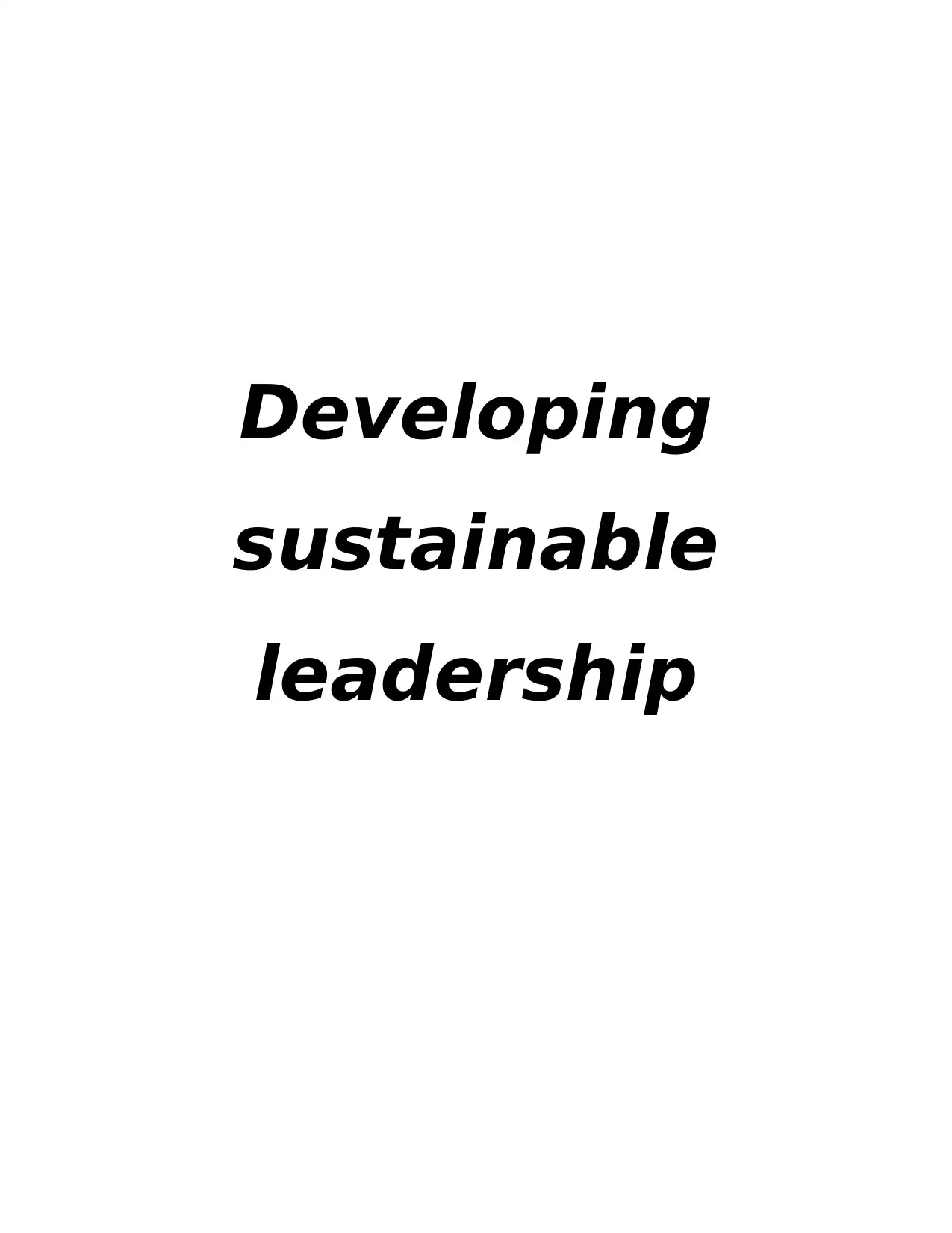
Developing
sustainable
leadership
sustainable
leadership
Paraphrase This Document
Need a fresh take? Get an instant paraphrase of this document with our AI Paraphraser
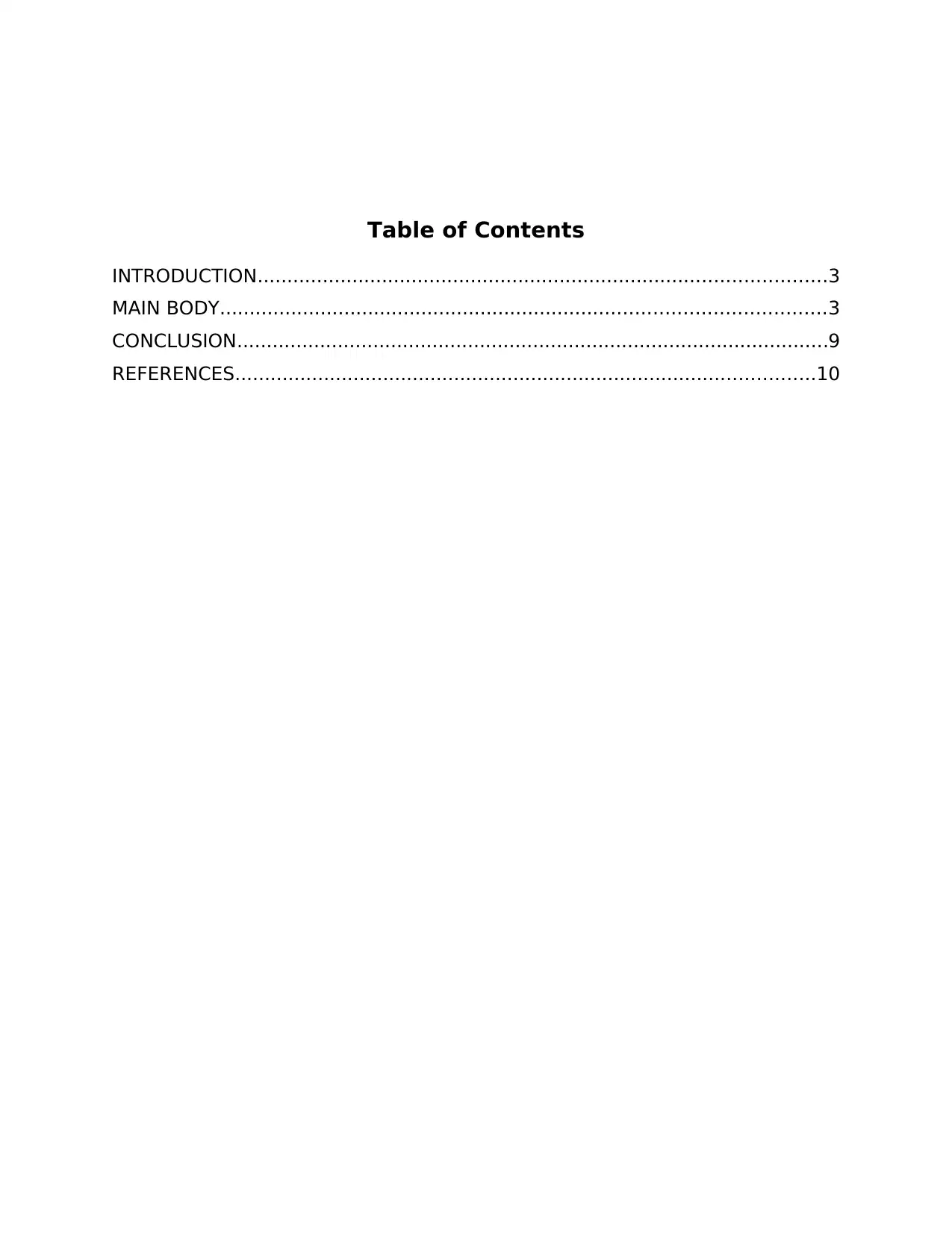
Table of Contents
INTRODUCTION................................................................................................3
MAIN BODY......................................................................................................3
CONCLUSION....................................................................................................9
REFERENCES..................................................................................................10
INTRODUCTION................................................................................................3
MAIN BODY......................................................................................................3
CONCLUSION....................................................................................................9
REFERENCES..................................................................................................10
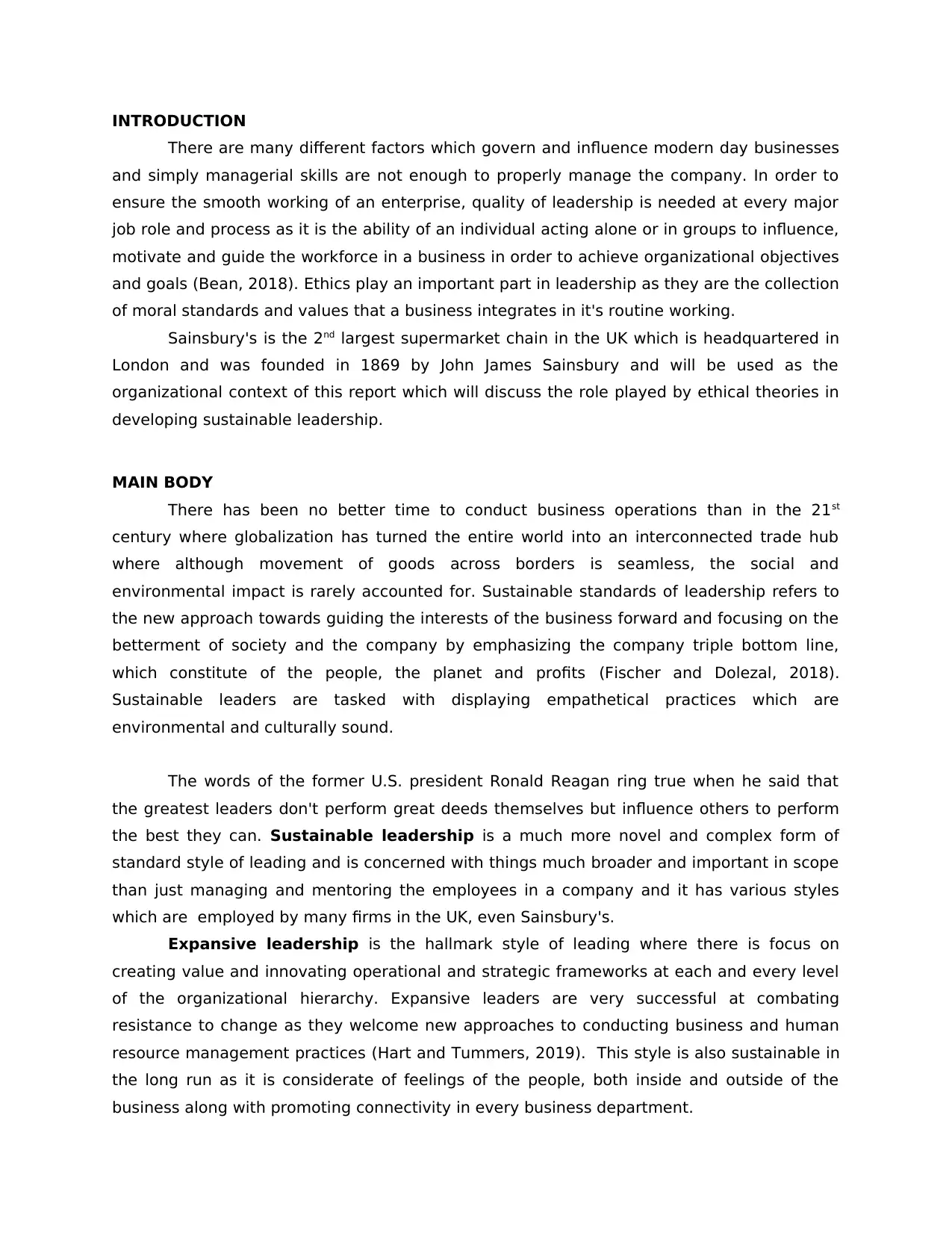
INTRODUCTION
There are many different factors which govern and influence modern day businesses
and simply managerial skills are not enough to properly manage the company. In order to
ensure the smooth working of an enterprise, quality of leadership is needed at every major
job role and process as it is the ability of an individual acting alone or in groups to influence,
motivate and guide the workforce in a business in order to achieve organizational objectives
and goals (Bean, 2018). Ethics play an important part in leadership as they are the collection
of moral standards and values that a business integrates in it's routine working.
Sainsbury's is the 2nd largest supermarket chain in the UK which is headquartered in
London and was founded in 1869 by John James Sainsbury and will be used as the
organizational context of this report which will discuss the role played by ethical theories in
developing sustainable leadership.
MAIN BODY
There has been no better time to conduct business operations than in the 21st
century where globalization has turned the entire world into an interconnected trade hub
where although movement of goods across borders is seamless, the social and
environmental impact is rarely accounted for. Sustainable standards of leadership refers to
the new approach towards guiding the interests of the business forward and focusing on the
betterment of society and the company by emphasizing the company triple bottom line,
which constitute of the people, the planet and profits (Fischer and Dolezal, 2018).
Sustainable leaders are tasked with displaying empathetical practices which are
environmental and culturally sound.
The words of the former U.S. president Ronald Reagan ring true when he said that
the greatest leaders don't perform great deeds themselves but influence others to perform
the best they can. Sustainable leadership is a much more novel and complex form of
standard style of leading and is concerned with things much broader and important in scope
than just managing and mentoring the employees in a company and it has various styles
which are employed by many firms in the UK, even Sainsbury's.
Expansive leadership is the hallmark style of leading where there is focus on
creating value and innovating operational and strategic frameworks at each and every level
of the organizational hierarchy. Expansive leaders are very successful at combating
resistance to change as they welcome new approaches to conducting business and human
resource management practices (Hart and Tummers, 2019). This style is also sustainable in
the long run as it is considerate of feelings of the people, both inside and outside of the
business along with promoting connectivity in every business department.
There are many different factors which govern and influence modern day businesses
and simply managerial skills are not enough to properly manage the company. In order to
ensure the smooth working of an enterprise, quality of leadership is needed at every major
job role and process as it is the ability of an individual acting alone or in groups to influence,
motivate and guide the workforce in a business in order to achieve organizational objectives
and goals (Bean, 2018). Ethics play an important part in leadership as they are the collection
of moral standards and values that a business integrates in it's routine working.
Sainsbury's is the 2nd largest supermarket chain in the UK which is headquartered in
London and was founded in 1869 by John James Sainsbury and will be used as the
organizational context of this report which will discuss the role played by ethical theories in
developing sustainable leadership.
MAIN BODY
There has been no better time to conduct business operations than in the 21st
century where globalization has turned the entire world into an interconnected trade hub
where although movement of goods across borders is seamless, the social and
environmental impact is rarely accounted for. Sustainable standards of leadership refers to
the new approach towards guiding the interests of the business forward and focusing on the
betterment of society and the company by emphasizing the company triple bottom line,
which constitute of the people, the planet and profits (Fischer and Dolezal, 2018).
Sustainable leaders are tasked with displaying empathetical practices which are
environmental and culturally sound.
The words of the former U.S. president Ronald Reagan ring true when he said that
the greatest leaders don't perform great deeds themselves but influence others to perform
the best they can. Sustainable leadership is a much more novel and complex form of
standard style of leading and is concerned with things much broader and important in scope
than just managing and mentoring the employees in a company and it has various styles
which are employed by many firms in the UK, even Sainsbury's.
Expansive leadership is the hallmark style of leading where there is focus on
creating value and innovating operational and strategic frameworks at each and every level
of the organizational hierarchy. Expansive leaders are very successful at combating
resistance to change as they welcome new approaches to conducting business and human
resource management practices (Hart and Tummers, 2019). This style is also sustainable in
the long run as it is considerate of feelings of the people, both inside and outside of the
business along with promoting connectivity in every business department.
⊘ This is a preview!⊘
Do you want full access?
Subscribe today to unlock all pages.

Trusted by 1+ million students worldwide
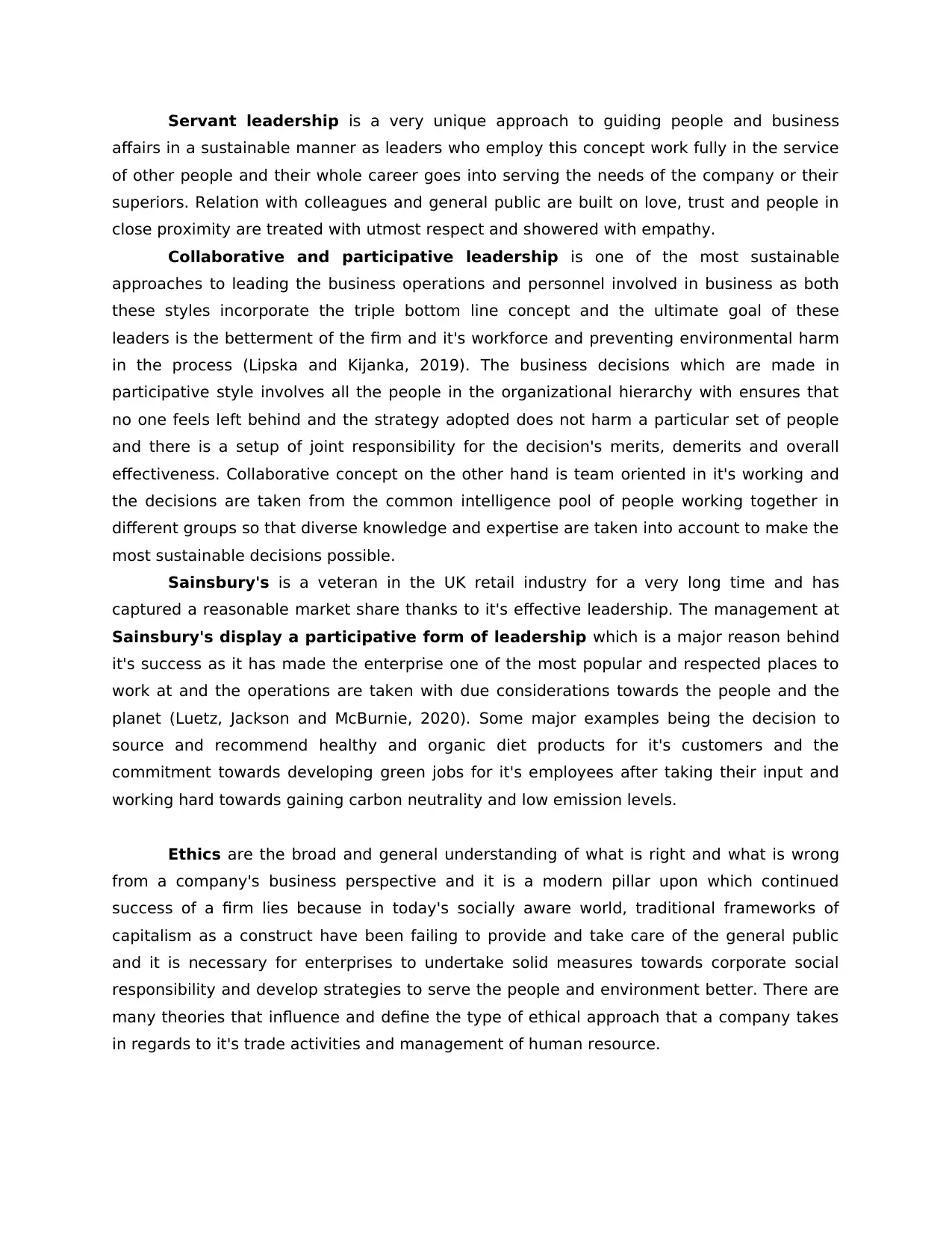
Servant leadership is a very unique approach to guiding people and business
affairs in a sustainable manner as leaders who employ this concept work fully in the service
of other people and their whole career goes into serving the needs of the company or their
superiors. Relation with colleagues and general public are built on love, trust and people in
close proximity are treated with utmost respect and showered with empathy.
Collaborative and participative leadership is one of the most sustainable
approaches to leading the business operations and personnel involved in business as both
these styles incorporate the triple bottom line concept and the ultimate goal of these
leaders is the betterment of the firm and it's workforce and preventing environmental harm
in the process (Lipska and Kijanka, 2019). The business decisions which are made in
participative style involves all the people in the organizational hierarchy with ensures that
no one feels left behind and the strategy adopted does not harm a particular set of people
and there is a setup of joint responsibility for the decision's merits, demerits and overall
effectiveness. Collaborative concept on the other hand is team oriented in it's working and
the decisions are taken from the common intelligence pool of people working together in
different groups so that diverse knowledge and expertise are taken into account to make the
most sustainable decisions possible.
Sainsbury's is a veteran in the UK retail industry for a very long time and has
captured a reasonable market share thanks to it's effective leadership. The management at
Sainsbury's display a participative form of leadership which is a major reason behind
it's success as it has made the enterprise one of the most popular and respected places to
work at and the operations are taken with due considerations towards the people and the
planet (Luetz, Jackson and McBurnie, 2020). Some major examples being the decision to
source and recommend healthy and organic diet products for it's customers and the
commitment towards developing green jobs for it's employees after taking their input and
working hard towards gaining carbon neutrality and low emission levels.
Ethics are the broad and general understanding of what is right and what is wrong
from a company's business perspective and it is a modern pillar upon which continued
success of a firm lies because in today's socially aware world, traditional frameworks of
capitalism as a construct have been failing to provide and take care of the general public
and it is necessary for enterprises to undertake solid measures towards corporate social
responsibility and develop strategies to serve the people and environment better. There are
many theories that influence and define the type of ethical approach that a company takes
in regards to it's trade activities and management of human resource.
affairs in a sustainable manner as leaders who employ this concept work fully in the service
of other people and their whole career goes into serving the needs of the company or their
superiors. Relation with colleagues and general public are built on love, trust and people in
close proximity are treated with utmost respect and showered with empathy.
Collaborative and participative leadership is one of the most sustainable
approaches to leading the business operations and personnel involved in business as both
these styles incorporate the triple bottom line concept and the ultimate goal of these
leaders is the betterment of the firm and it's workforce and preventing environmental harm
in the process (Lipska and Kijanka, 2019). The business decisions which are made in
participative style involves all the people in the organizational hierarchy with ensures that
no one feels left behind and the strategy adopted does not harm a particular set of people
and there is a setup of joint responsibility for the decision's merits, demerits and overall
effectiveness. Collaborative concept on the other hand is team oriented in it's working and
the decisions are taken from the common intelligence pool of people working together in
different groups so that diverse knowledge and expertise are taken into account to make the
most sustainable decisions possible.
Sainsbury's is a veteran in the UK retail industry for a very long time and has
captured a reasonable market share thanks to it's effective leadership. The management at
Sainsbury's display a participative form of leadership which is a major reason behind
it's success as it has made the enterprise one of the most popular and respected places to
work at and the operations are taken with due considerations towards the people and the
planet (Luetz, Jackson and McBurnie, 2020). Some major examples being the decision to
source and recommend healthy and organic diet products for it's customers and the
commitment towards developing green jobs for it's employees after taking their input and
working hard towards gaining carbon neutrality and low emission levels.
Ethics are the broad and general understanding of what is right and what is wrong
from a company's business perspective and it is a modern pillar upon which continued
success of a firm lies because in today's socially aware world, traditional frameworks of
capitalism as a construct have been failing to provide and take care of the general public
and it is necessary for enterprises to undertake solid measures towards corporate social
responsibility and develop strategies to serve the people and environment better. There are
many theories that influence and define the type of ethical approach that a company takes
in regards to it's trade activities and management of human resource.
Paraphrase This Document
Need a fresh take? Get an instant paraphrase of this document with our AI Paraphraser
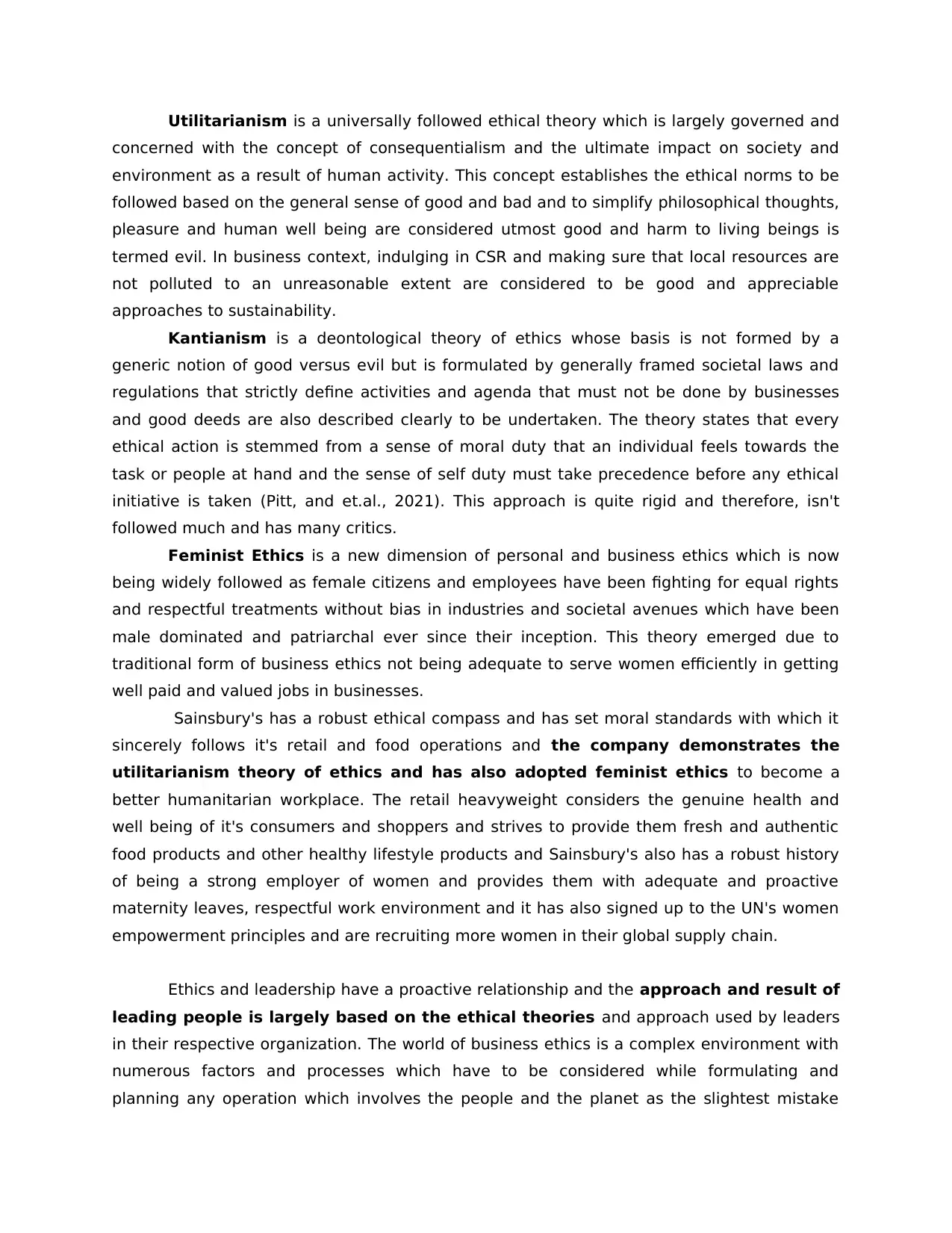
Utilitarianism is a universally followed ethical theory which is largely governed and
concerned with the concept of consequentialism and the ultimate impact on society and
environment as a result of human activity. This concept establishes the ethical norms to be
followed based on the general sense of good and bad and to simplify philosophical thoughts,
pleasure and human well being are considered utmost good and harm to living beings is
termed evil. In business context, indulging in CSR and making sure that local resources are
not polluted to an unreasonable extent are considered to be good and appreciable
approaches to sustainability.
Kantianism is a deontological theory of ethics whose basis is not formed by a
generic notion of good versus evil but is formulated by generally framed societal laws and
regulations that strictly define activities and agenda that must not be done by businesses
and good deeds are also described clearly to be undertaken. The theory states that every
ethical action is stemmed from a sense of moral duty that an individual feels towards the
task or people at hand and the sense of self duty must take precedence before any ethical
initiative is taken (Pitt, and et.al., 2021). This approach is quite rigid and therefore, isn't
followed much and has many critics.
Feminist Ethics is a new dimension of personal and business ethics which is now
being widely followed as female citizens and employees have been fighting for equal rights
and respectful treatments without bias in industries and societal avenues which have been
male dominated and patriarchal ever since their inception. This theory emerged due to
traditional form of business ethics not being adequate to serve women efficiently in getting
well paid and valued jobs in businesses.
Sainsbury's has a robust ethical compass and has set moral standards with which it
sincerely follows it's retail and food operations and the company demonstrates the
utilitarianism theory of ethics and has also adopted feminist ethics to become a
better humanitarian workplace. The retail heavyweight considers the genuine health and
well being of it's consumers and shoppers and strives to provide them fresh and authentic
food products and other healthy lifestyle products and Sainsbury's also has a robust history
of being a strong employer of women and provides them with adequate and proactive
maternity leaves, respectful work environment and it has also signed up to the UN's women
empowerment principles and are recruiting more women in their global supply chain.
Ethics and leadership have a proactive relationship and the approach and result of
leading people is largely based on the ethical theories and approach used by leaders
in their respective organization. The world of business ethics is a complex environment with
numerous factors and processes which have to be considered while formulating and
planning any operation which involves the people and the planet as the slightest mistake
concerned with the concept of consequentialism and the ultimate impact on society and
environment as a result of human activity. This concept establishes the ethical norms to be
followed based on the general sense of good and bad and to simplify philosophical thoughts,
pleasure and human well being are considered utmost good and harm to living beings is
termed evil. In business context, indulging in CSR and making sure that local resources are
not polluted to an unreasonable extent are considered to be good and appreciable
approaches to sustainability.
Kantianism is a deontological theory of ethics whose basis is not formed by a
generic notion of good versus evil but is formulated by generally framed societal laws and
regulations that strictly define activities and agenda that must not be done by businesses
and good deeds are also described clearly to be undertaken. The theory states that every
ethical action is stemmed from a sense of moral duty that an individual feels towards the
task or people at hand and the sense of self duty must take precedence before any ethical
initiative is taken (Pitt, and et.al., 2021). This approach is quite rigid and therefore, isn't
followed much and has many critics.
Feminist Ethics is a new dimension of personal and business ethics which is now
being widely followed as female citizens and employees have been fighting for equal rights
and respectful treatments without bias in industries and societal avenues which have been
male dominated and patriarchal ever since their inception. This theory emerged due to
traditional form of business ethics not being adequate to serve women efficiently in getting
well paid and valued jobs in businesses.
Sainsbury's has a robust ethical compass and has set moral standards with which it
sincerely follows it's retail and food operations and the company demonstrates the
utilitarianism theory of ethics and has also adopted feminist ethics to become a
better humanitarian workplace. The retail heavyweight considers the genuine health and
well being of it's consumers and shoppers and strives to provide them fresh and authentic
food products and other healthy lifestyle products and Sainsbury's also has a robust history
of being a strong employer of women and provides them with adequate and proactive
maternity leaves, respectful work environment and it has also signed up to the UN's women
empowerment principles and are recruiting more women in their global supply chain.
Ethics and leadership have a proactive relationship and the approach and result of
leading people is largely based on the ethical theories and approach used by leaders
in their respective organization. The world of business ethics is a complex environment with
numerous factors and processes which have to be considered while formulating and
planning any operation which involves the people and the planet as the slightest mistake
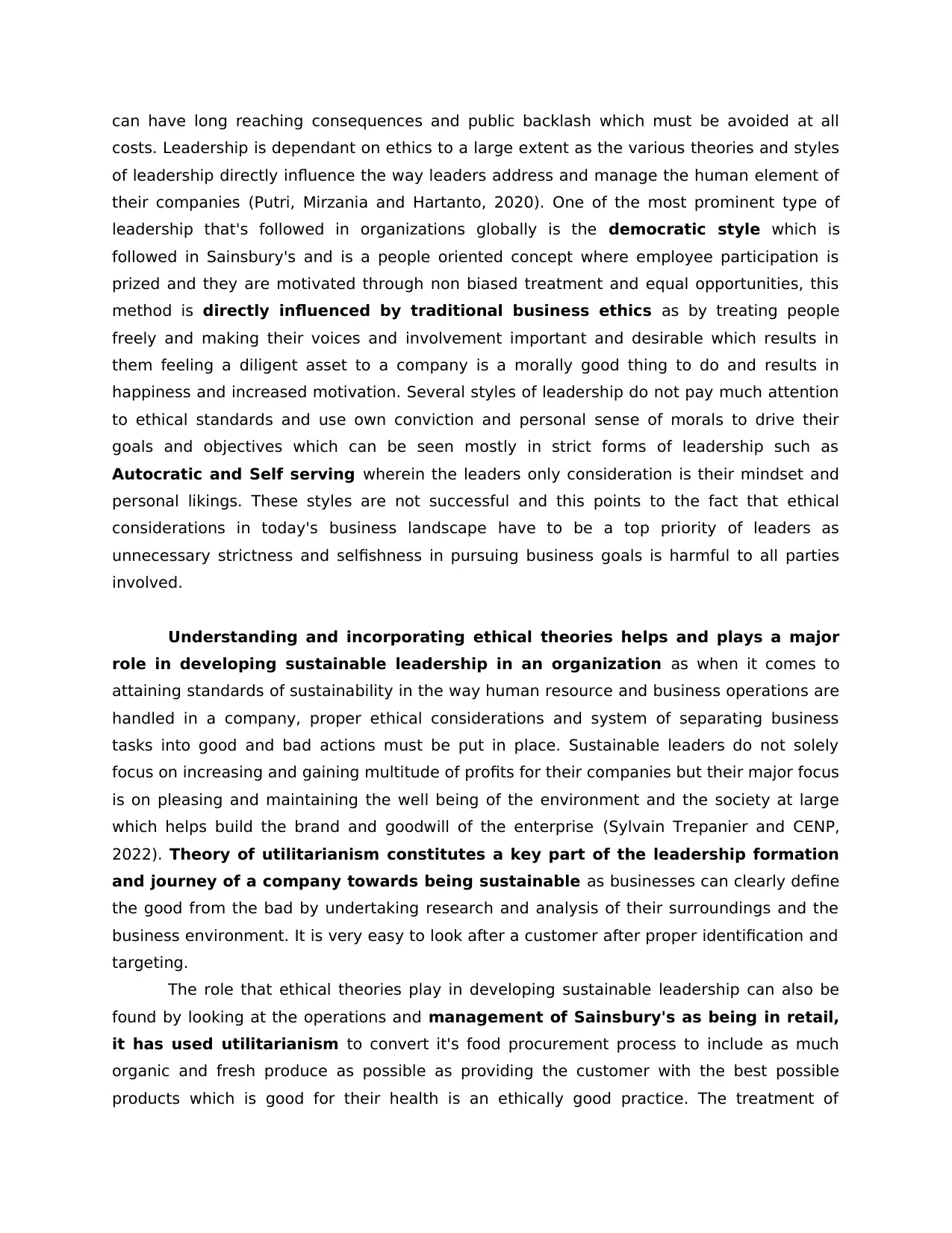
can have long reaching consequences and public backlash which must be avoided at all
costs. Leadership is dependant on ethics to a large extent as the various theories and styles
of leadership directly influence the way leaders address and manage the human element of
their companies (Putri, Mirzania and Hartanto, 2020). One of the most prominent type of
leadership that's followed in organizations globally is the democratic style which is
followed in Sainsbury's and is a people oriented concept where employee participation is
prized and they are motivated through non biased treatment and equal opportunities, this
method is directly influenced by traditional business ethics as by treating people
freely and making their voices and involvement important and desirable which results in
them feeling a diligent asset to a company is a morally good thing to do and results in
happiness and increased motivation. Several styles of leadership do not pay much attention
to ethical standards and use own conviction and personal sense of morals to drive their
goals and objectives which can be seen mostly in strict forms of leadership such as
Autocratic and Self serving wherein the leaders only consideration is their mindset and
personal likings. These styles are not successful and this points to the fact that ethical
considerations in today's business landscape have to be a top priority of leaders as
unnecessary strictness and selfishness in pursuing business goals is harmful to all parties
involved.
Understanding and incorporating ethical theories helps and plays a major
role in developing sustainable leadership in an organization as when it comes to
attaining standards of sustainability in the way human resource and business operations are
handled in a company, proper ethical considerations and system of separating business
tasks into good and bad actions must be put in place. Sustainable leaders do not solely
focus on increasing and gaining multitude of profits for their companies but their major focus
is on pleasing and maintaining the well being of the environment and the society at large
which helps build the brand and goodwill of the enterprise (Sylvain Trepanier and CENP,
2022). Theory of utilitarianism constitutes a key part of the leadership formation
and journey of a company towards being sustainable as businesses can clearly define
the good from the bad by undertaking research and analysis of their surroundings and the
business environment. It is very easy to look after a customer after proper identification and
targeting.
The role that ethical theories play in developing sustainable leadership can also be
found by looking at the operations and management of Sainsbury's as being in retail,
it has used utilitarianism to convert it's food procurement process to include as much
organic and fresh produce as possible as providing the customer with the best possible
products which is good for their health is an ethically good practice. The treatment of
costs. Leadership is dependant on ethics to a large extent as the various theories and styles
of leadership directly influence the way leaders address and manage the human element of
their companies (Putri, Mirzania and Hartanto, 2020). One of the most prominent type of
leadership that's followed in organizations globally is the democratic style which is
followed in Sainsbury's and is a people oriented concept where employee participation is
prized and they are motivated through non biased treatment and equal opportunities, this
method is directly influenced by traditional business ethics as by treating people
freely and making their voices and involvement important and desirable which results in
them feeling a diligent asset to a company is a morally good thing to do and results in
happiness and increased motivation. Several styles of leadership do not pay much attention
to ethical standards and use own conviction and personal sense of morals to drive their
goals and objectives which can be seen mostly in strict forms of leadership such as
Autocratic and Self serving wherein the leaders only consideration is their mindset and
personal likings. These styles are not successful and this points to the fact that ethical
considerations in today's business landscape have to be a top priority of leaders as
unnecessary strictness and selfishness in pursuing business goals is harmful to all parties
involved.
Understanding and incorporating ethical theories helps and plays a major
role in developing sustainable leadership in an organization as when it comes to
attaining standards of sustainability in the way human resource and business operations are
handled in a company, proper ethical considerations and system of separating business
tasks into good and bad actions must be put in place. Sustainable leaders do not solely
focus on increasing and gaining multitude of profits for their companies but their major focus
is on pleasing and maintaining the well being of the environment and the society at large
which helps build the brand and goodwill of the enterprise (Sylvain Trepanier and CENP,
2022). Theory of utilitarianism constitutes a key part of the leadership formation
and journey of a company towards being sustainable as businesses can clearly define
the good from the bad by undertaking research and analysis of their surroundings and the
business environment. It is very easy to look after a customer after proper identification and
targeting.
The role that ethical theories play in developing sustainable leadership can also be
found by looking at the operations and management of Sainsbury's as being in retail,
it has used utilitarianism to convert it's food procurement process to include as much
organic and fresh produce as possible as providing the customer with the best possible
products which is good for their health is an ethically good practice. The treatment of
⊘ This is a preview!⊘
Do you want full access?
Subscribe today to unlock all pages.

Trusted by 1+ million students worldwide
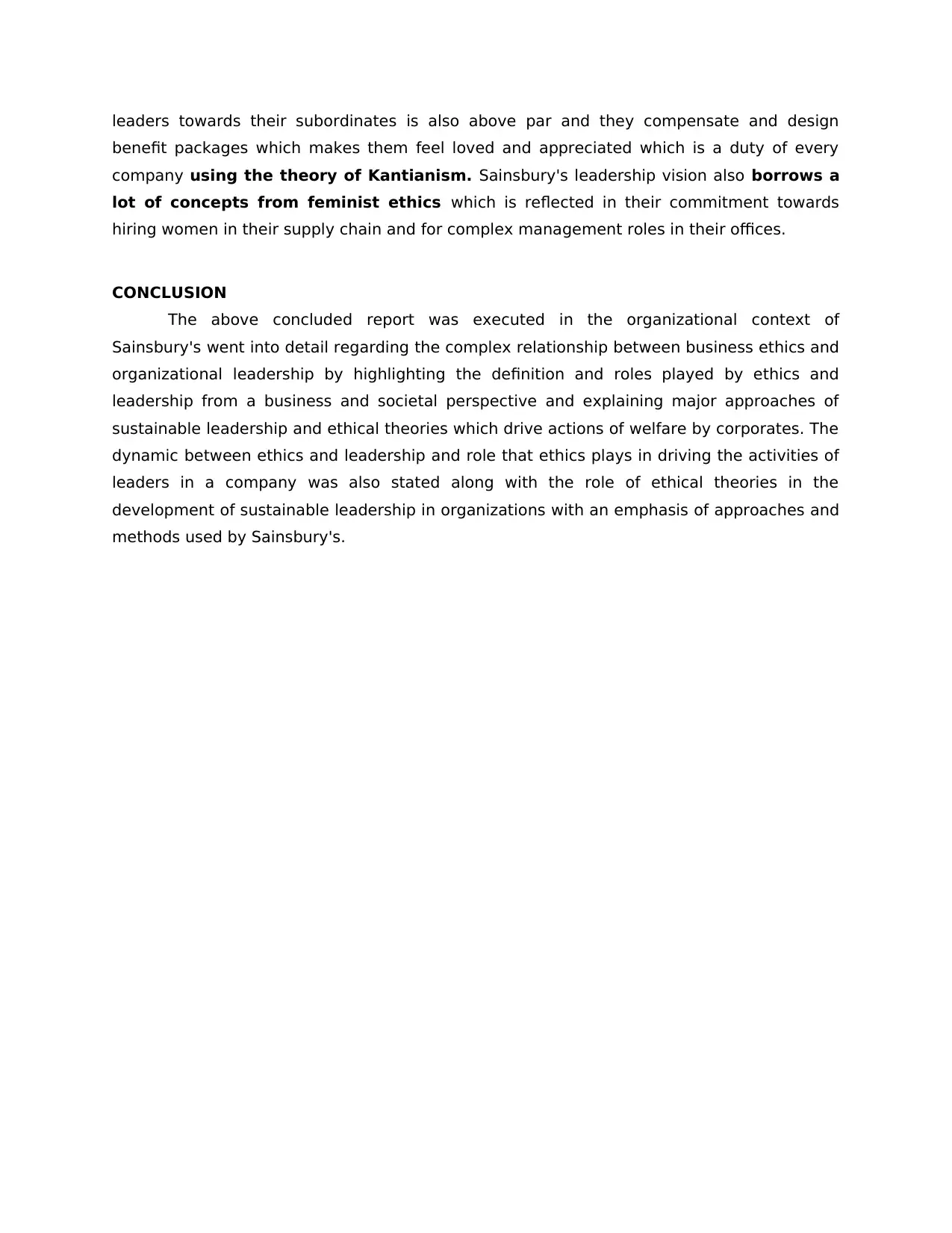
leaders towards their subordinates is also above par and they compensate and design
benefit packages which makes them feel loved and appreciated which is a duty of every
company using the theory of Kantianism. Sainsbury's leadership vision also borrows a
lot of concepts from feminist ethics which is reflected in their commitment towards
hiring women in their supply chain and for complex management roles in their offices.
CONCLUSION
The above concluded report was executed in the organizational context of
Sainsbury's went into detail regarding the complex relationship between business ethics and
organizational leadership by highlighting the definition and roles played by ethics and
leadership from a business and societal perspective and explaining major approaches of
sustainable leadership and ethical theories which drive actions of welfare by corporates. The
dynamic between ethics and leadership and role that ethics plays in driving the activities of
leaders in a company was also stated along with the role of ethical theories in the
development of sustainable leadership in organizations with an emphasis of approaches and
methods used by Sainsbury's.
benefit packages which makes them feel loved and appreciated which is a duty of every
company using the theory of Kantianism. Sainsbury's leadership vision also borrows a
lot of concepts from feminist ethics which is reflected in their commitment towards
hiring women in their supply chain and for complex management roles in their offices.
CONCLUSION
The above concluded report was executed in the organizational context of
Sainsbury's went into detail regarding the complex relationship between business ethics and
organizational leadership by highlighting the definition and roles played by ethics and
leadership from a business and societal perspective and explaining major approaches of
sustainable leadership and ethical theories which drive actions of welfare by corporates. The
dynamic between ethics and leadership and role that ethics plays in driving the activities of
leaders in a company was also stated along with the role of ethical theories in the
development of sustainable leadership in organizations with an emphasis of approaches and
methods used by Sainsbury's.
Paraphrase This Document
Need a fresh take? Get an instant paraphrase of this document with our AI Paraphraser
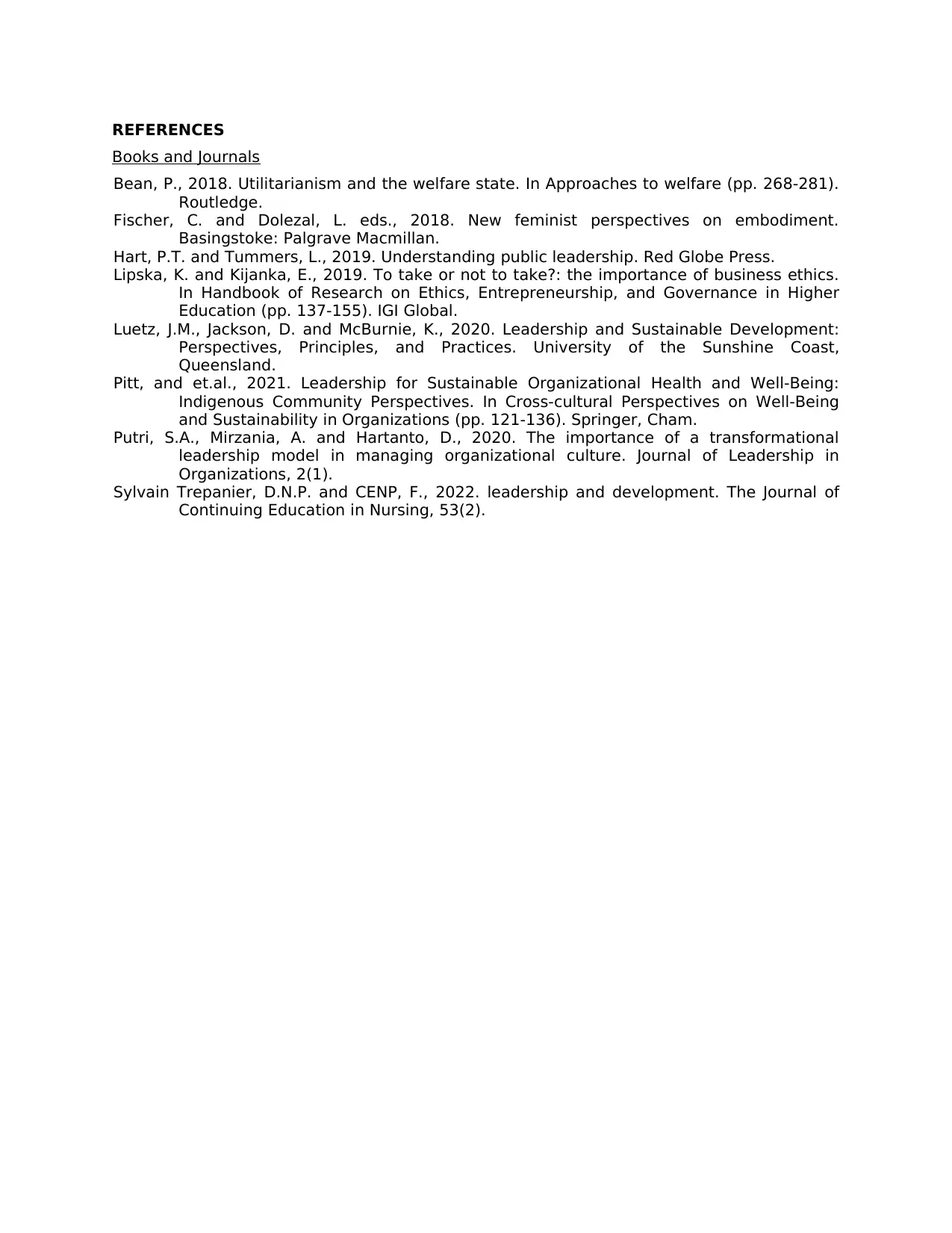
REFERENCES
Books and Journals
Bean, P., 2018. Utilitarianism and the welfare state. In Approaches to welfare (pp. 268-281).
Routledge.
Fischer, C. and Dolezal, L. eds., 2018. New feminist perspectives on embodiment.
Basingstoke: Palgrave Macmillan.
Hart, P.T. and Tummers, L., 2019. Understanding public leadership. Red Globe Press.
Lipska, K. and Kijanka, E., 2019. To take or not to take?: the importance of business ethics.
In Handbook of Research on Ethics, Entrepreneurship, and Governance in Higher
Education (pp. 137-155). IGI Global.
Luetz, J.M., Jackson, D. and McBurnie, K., 2020. Leadership and Sustainable Development:
Perspectives, Principles, and Practices. University of the Sunshine Coast,
Queensland.
Pitt, and et.al., 2021. Leadership for Sustainable Organizational Health and Well-Being:
Indigenous Community Perspectives. In Cross-cultural Perspectives on Well-Being
and Sustainability in Organizations (pp. 121-136). Springer, Cham.
Putri, S.A., Mirzania, A. and Hartanto, D., 2020. The importance of a transformational
leadership model in managing organizational culture. Journal of Leadership in
Organizations, 2(1).
Sylvain Trepanier, D.N.P. and CENP, F., 2022. leadership and development. The Journal of
Continuing Education in Nursing, 53(2).
Books and Journals
Bean, P., 2018. Utilitarianism and the welfare state. In Approaches to welfare (pp. 268-281).
Routledge.
Fischer, C. and Dolezal, L. eds., 2018. New feminist perspectives on embodiment.
Basingstoke: Palgrave Macmillan.
Hart, P.T. and Tummers, L., 2019. Understanding public leadership. Red Globe Press.
Lipska, K. and Kijanka, E., 2019. To take or not to take?: the importance of business ethics.
In Handbook of Research on Ethics, Entrepreneurship, and Governance in Higher
Education (pp. 137-155). IGI Global.
Luetz, J.M., Jackson, D. and McBurnie, K., 2020. Leadership and Sustainable Development:
Perspectives, Principles, and Practices. University of the Sunshine Coast,
Queensland.
Pitt, and et.al., 2021. Leadership for Sustainable Organizational Health and Well-Being:
Indigenous Community Perspectives. In Cross-cultural Perspectives on Well-Being
and Sustainability in Organizations (pp. 121-136). Springer, Cham.
Putri, S.A., Mirzania, A. and Hartanto, D., 2020. The importance of a transformational
leadership model in managing organizational culture. Journal of Leadership in
Organizations, 2(1).
Sylvain Trepanier, D.N.P. and CENP, F., 2022. leadership and development. The Journal of
Continuing Education in Nursing, 53(2).
1 out of 8
Related Documents
Your All-in-One AI-Powered Toolkit for Academic Success.
+13062052269
info@desklib.com
Available 24*7 on WhatsApp / Email
![[object Object]](/_next/static/media/star-bottom.7253800d.svg)
Unlock your academic potential
Copyright © 2020–2025 A2Z Services. All Rights Reserved. Developed and managed by ZUCOL.




